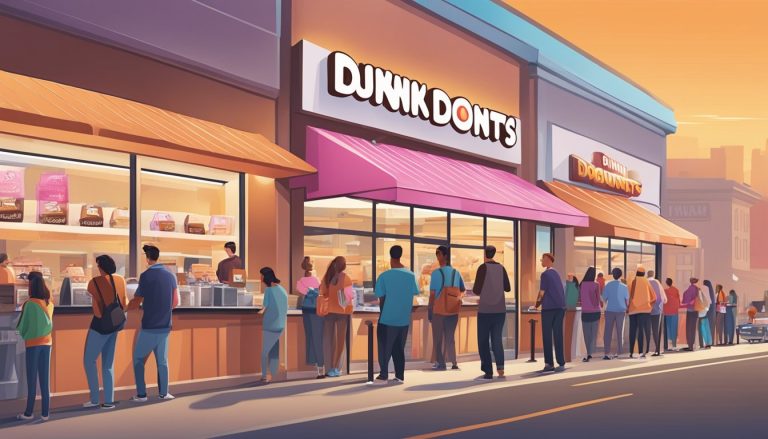Dunkin’ has become an integral part of New England’s cultural fabric since its founding in Quincy, Massachusetts in 1950. The pink and orange signs dot the landscape, serving as familiar beacons for locals and visitors alike. Dunkin’ is more than just a coffee chain in New England; it represents a shared regional identity and a source of pride for many residents.
The company’s roots in the area run deep, tracing back to William Rosenberg’s mobile food service for factory workers during World War II. This connection to the working class has helped cement Dunkin’s place in New England culture. The brand’s ubiquity in the region reflects its status as a beloved institution, with stores found on nearly every corner in many towns and cities.
Dunkin’s coffee has become synonymous with the New England way of life. Its popularity transcends social and economic boundaries, bringing together people from all walks of life over a cup of their signature brew. This shared experience has helped create a sense of community and continuity in a rapidly changing world, making Dunkin’ an enduring symbol of New England’s unique character.
Dunkin’ Donuts Origins and Expansion

Dunkin’ Donuts began as a small operation in Quincy, Massachusetts before growing into a beloved regional chain and eventually a national coffee empire. Its journey embodies the classic American dream of entrepreneurial success.
William Rosenberg and the Birth of an Icon
William Rosenberg opened the first Dunkin’ Donuts in 1950 in Quincy, Massachusetts. The shop evolved from his successful Industrial Luncheon Service, which served factory workers during World War II.
Rosenberg’s keen business sense led him to focus on coffee and donuts – two items that sold particularly well. He priced his coffee at 10 cents, half the price of his competitors.
The name “Dunkin’ Donuts” was inspired by the practice of dunking donuts in coffee. This simple yet catchy name would become synonymous with quick, affordable breakfast options.
From Quincy to a Northeast Staple
Dunkin’ Donuts rapidly expanded throughout the Northeast in the 1950s and 1960s. Rosenberg began franchising the business in 1955, allowing for faster growth.
The chain became deeply ingrained in New England culture. Its orange and pink color scheme and familiar logo became ubiquitous sights along highways and in town centers.
By the 1970s, Dunkin’ Donuts had over 1,000 locations, primarily in the Northeast. The brand’s expansion was fueled by its affordable prices and consistent quality.
Becoming a National Coffee Empire
In the 1990s, Dunkin’ Donuts began to shift its focus towards coffee. This strategic move positioned the company to compete with emerging premium coffee chains.
The brand expanded its coffee offerings, introducing flavored coffees and iced beverages. This pivot helped Dunkin’ appeal to a broader customer base beyond its traditional donut-loving clientele.
Dunkin’ Donuts continued its national expansion, moving beyond its Northeast roots. By 2025, the company has over 12,000 locations worldwide, with a significant presence across the United States.
Cultural Impact in New England
Dunkin’ has become deeply woven into the fabric of New England society, shaping regional identity and cultural touchstones. The brand’s influence extends far beyond coffee and donuts.
Embedded in the Bostonian Identity
Dunkin’ is synonymous with Boston culture. The pink and orange signs dot the landscape, serving as familiar landmarks. For many Bostonians, starting the day with Dunkin’ coffee is a cherished ritual. The brand’s working-class roots resonate with the city’s blue-collar heritage. Dunkin’s straightforward, no-frills approach to food and drink aligns with Boston’s practical, down-to-earth ethos. The company’s local origins in Quincy, Massachusetts, just outside Boston, further cement its status as a homegrown success story.
Sports Affiliations and Regional Pride
Dunkin’ has forged strong ties with New England sports teams, particularly the Boston Red Sox and New England Patriots. These partnerships reinforce regional pride and identity. Dunkin’ advertisements feature prominently at Fenway Park and Gillette Stadium. The brand often collaborates with local athletes for promotions and charitable initiatives. This sports connection helps Dunkin’ maintain its image as an integral part of New England culture, even as it expands globally.
Community Engagement and Local Identity
Dunkin’ actively participates in community events and charitable efforts throughout New England. The company supports local food banks, children’s hospitals, and disaster relief efforts. Many franchisees are deeply involved in their local communities, sponsoring youth sports teams and school events. This grassroots engagement strengthens Dunkin’s position as a local institution rather than just another fast-food chain. The brand’s ubiquity and community presence make it a shared experience that unites New Englanders across different backgrounds and social strata.
Brand Image and Marketing

Dunkin’ has cultivated a strong brand identity through iconic marketing campaigns and customer-focused initiatives. The company’s strategies have helped it compete with larger rivals and build lasting connections with New England consumers.
Time to Make the Donuts and Fred the Baker
Fred the Baker, portrayed by actor Michael Vale, became the face of Dunkin’ in the 1980s and 1990s. His catchphrase “Time to make the donuts” resonated with audiences, emphasizing Dunkin’s commitment to fresh products and hard work. The campaign ran for 15 years, making Fred one of the most recognizable advertising characters in the U.S.
Vale’s portrayal of the dedicated baker waking up early each morning struck a chord with working-class New Englanders. The ads reinforced Dunkin’s image as a reliable, no-frills option for busy people.
Competing with Starbucks
As Starbucks expanded rapidly in the 1990s and 2000s, Dunkin’ positioned itself as a more affordable, unpretentious alternative. The company emphasized its roots as a working-class brand founded by Bill Rosenberg in Quincy, Massachusetts.
Dunkin’ focused on quick service and value pricing to differentiate itself. The slogan “America Runs on Dunkin'” highlighted the brand’s role in fueling everyday activities.
The company also expanded its coffee offerings to compete with Starbucks, introducing espresso drinks and flavored options. This strategy allowed Dunkin’ to retain its core customers while attracting new ones seeking specialty beverages.
Customer Loyalty Programs and Brand Trust
Dunkin’s DD Perks rewards program has been crucial in fostering customer loyalty. The program offers points for purchases, free birthday drinks, and exclusive offers. This digital engagement helps Dunkin’ compete with tech-savvy rivals.
The company has also built trust through consistent quality and community involvement. Local franchisees often sponsor youth sports teams and participate in charitable events.
Dunkin’s long history in New England contributes to its perceived trustworthiness. Many customers have grown up with the brand, creating a sense of nostalgia and familiarity that reinforces their loyalty.
Product Offerings and Consumer Habits

Dunkin’ has shaped New England’s food and beverage landscape with its diverse menu. The brand’s offerings cater to local tastes and habits, creating a unique regional identity.
Coffee: Beyond Just a Beverage
Dunkin’s coffee holds a special place in New England culture. The brand’s signature blend, known for its smooth taste and caffeine kick, fuels the region’s fast-paced lifestyle. Dunkin’ serves over 2 billion cups of coffee annually, with a significant portion consumed in New England.
Hot and iced options are available year-round, reflecting the region’s unpredictable weather. The “regular” coffee order – medium with cream and sugar – is a New England staple.
Dunkin’ has expanded its coffee category to include espresso-based drinks, cold brew, and flavored options. This variety appeals to both traditionalists and younger consumers seeking trendy beverages.
Donuts and Munchkins: A Bite of Happiness
Donuts remain at the heart of Dunkin’s offerings. The Boston Cream Donut, Massachusetts’ official state donut, exemplifies the brand’s regional significance.
Munchkins, Dunkin’s donut holes, are popular for sharing at offices and social gatherings. These bite-sized treats come in various flavors, catering to different preferences.
Seasonal and limited-time offerings keep the menu fresh and exciting. Pumpkin-flavored items in fall and heart-shaped donuts for Valentine’s Day create anticipation and boost sales.
Breakfast Items and the Power of Affordability
Dunkin’s breakfast menu has evolved to meet changing consumer needs. Sandwiches, wraps, and bagels offer quick, affordable meal options for busy New Englanders.
The brand’s competitive pricing strategy aligns with the region’s practical mindset. Value meals and combo deals provide cost-effective choices for budget-conscious customers.
Dunkin’s breakfast items often incorporate regional flavors and ingredients. This localization strengthens the brand’s connection to New England culture and tastes.
Dunkin’ Beyond New England

Dunkin’ has expanded far beyond its New England roots, becoming a national and global brand. Its growth showcases the universal appeal of its coffee and food offerings, while still maintaining a strong cultural connection to its origins.
Franchise Growth and National Reach
Dunkin’ has experienced significant franchise growth across the United States. Surprisingly, New York now boasts the highest number of Dunkin’ locations, surpassing even Massachusetts. With 1,436 stores statewide, New York exemplifies Dunkin’s successful expansion beyond New England.
The brand’s presence in neighboring states like Connecticut further demonstrates its regional influence. Dunkin’ has adapted to local tastes and preferences while maintaining its core identity as an American coffee chain.
The Cultural Institution in a Global Market
As Dunkin’ ventures into the global market, it faces unique challenges and opportunities. The brand provides an interesting case study of coffee consumption as an expression of identity, particularly when compared to competitors like Starbucks.
Dunkin’ has evolved its offerings beyond just donuts, reflected in its recent name change to simply “Dunkin'”. This shift allows the brand to position itself as a beverage-led, on-the-go brand in international markets.
Despite its global expansion, Dunkin’ maintains its image as a cultural institution. The brand’s ability to balance local loyalty with global appeal has been key to its success in new markets.




